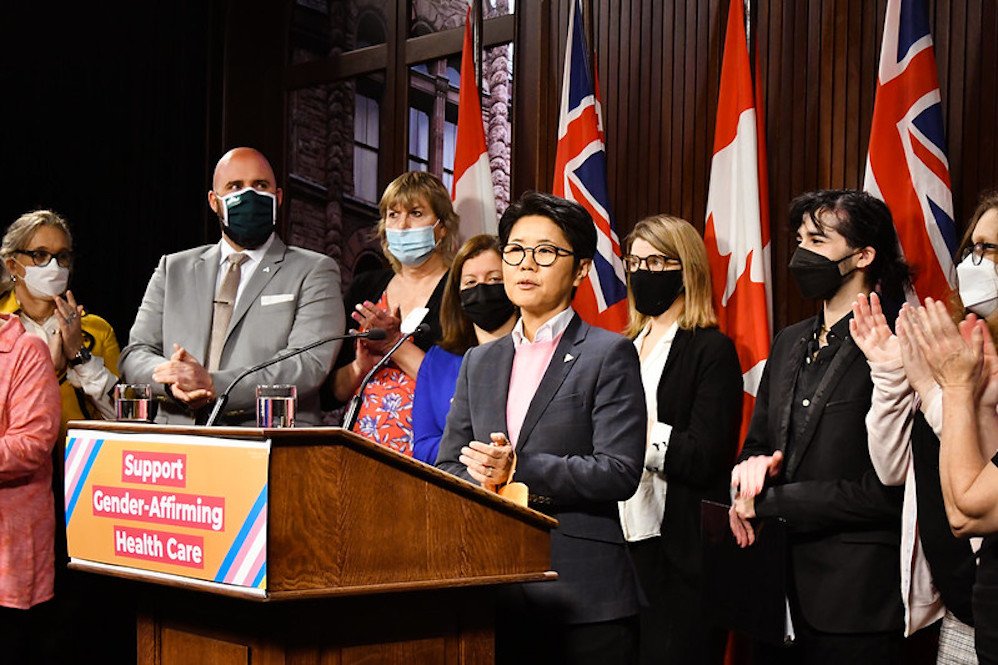Toronto Centre NDP MPP Kristyn Wong-Tam tabled a bill yesterday that would give trans and gender-diverse people a greater say in Ontario healthcare policy.
“For the trans and gender-diverse community, the healthcare crisis has existed from the birth of Medicare in Canada—because they’ve never been included,” Wong-Tam says. “Whether it’s private practice, community healthcare practice or public health practice, we haven’t seen across-the-board, universal access in Ontario for trans and gender-diverse people.”
If passed, the Gender Affirming Health Care Advisory Committee Act would give Ontario health minister Sylvia Jones 60 days to build an advisory committee. This group would then be tasked with developing recommendations for improving provincial gender-affirming healthcare.
The committee would consist of trans, Two-Spirit, non-binary, intersex and gender-diverse people and healthcare providers who have experience working with them .
After a maximum of six months, the committee would submit a report to the health minister, who would then have 90 days to bring the approved suggestions to the legislative assembly.
“This is a bill that has been long fought for by trans, non-binary and gender-diverse people,” says Wong-Tam. The drafting of the bill was informed by healthcare providers and community partners including Rainbow Health Ontario and The 519, a Toronto LGBTQ2S+ advocacy organization. The bill is co-sponsored by queer NDP MPPs Lise Vaugeois, Terence Kernaghan and Jill Andrew.
Wong-Tam’s bill is identical to the one introduced by Wong-Tam’s predecessor, former Toronto Centre MPP Suze Morrison, last October.
Morrison’s bill passed second reading, but failed to progress to the third reading for final approval by the legislative assembly. Private members’ public bills—which are introduced by members who are not the speaker or a cabinet minister—rarely enter third reading and become law.
According to Wong-Tam, the passage of Morrison’s bill was delayed due to the provincial election this June. “It’s more urgent today than it was even when Suze tabled it,” they say. “Our community has now lived through even more harm.”
While the pandemic has exacerbated the impact of the healthcare crisis on all Ontarians, Wong-Tam says trans and gender-diverse people have been hit even harder due to systemic inequalities.
Wong-Tam also pointed to the shortage of primary care physicians across the province. In September, the Ontario College of Family Physicians issued a news release noting that as of March 2020, almost 1.8 million Ontarians did not have a regular family doctor. If current trends continue, one in five Ontarians may not have a family doctor by 2025.
“If we’re seeing people fall through the cracks today, imagine if you are a trans and gender-diverse person,” says Wong-Tam. “Those cracks are the size of a Grand Canyon.”
In the 2019 Trans PULSE Canada survey, 45 percent of trans and non-binary respondents in Canada identified one or more unmet healthcare needs over the past year. Only 26 percent of trans and non-binary Canadians indicated that they had all the gender-affirming medical care they needed.
A 2020 follow-up survey explored the impacts of COVID-19 and healthcare avoidance among trans and non-binary people in Canada. Respondents reported challenges such as reduced access to general and gender-affirming healthcare, greater financial, employment and housing precarity, strained social networks and heightened safety concerns.
The 2020 survey showed that among 820 respondents, 126—or about 15.4 per cent—did not have a primary care provider. Among those with a primary care provider, 61.2 percent reported fair or poor mental health, and 25.7 percent reported avoiding care since the start of the pandemic.
Wong-Tam says their bill would remove barriers to healthcare for trans and gender-diverse communities and ensure timely delivery of care. The proposed advisory committee would make recommendations about shortening wait times and reducing referral requirements.
The committee would also look into expanding provincial insurance coverage for gender-affirming procedures. While most major provinces cover the entire top surgery procedure, Ontario’s healthcare plan (OHIP) only pays for the basic mastectomy. Patients are often forced to pay thousands of dollars in “contouring fees.”
If Wong-Tam’s bill is passed, recommendations would be made to increase OHIP coverage to include chest contouring and other treatments such as facial feminization and electrolysis.
“It allows for life-saving procedures,” says Wong-Tam. “It’s not a nice-to-have, as some people would like to say, but rather a must-have.”


 Why you can trust Xtra
Why you can trust Xtra


